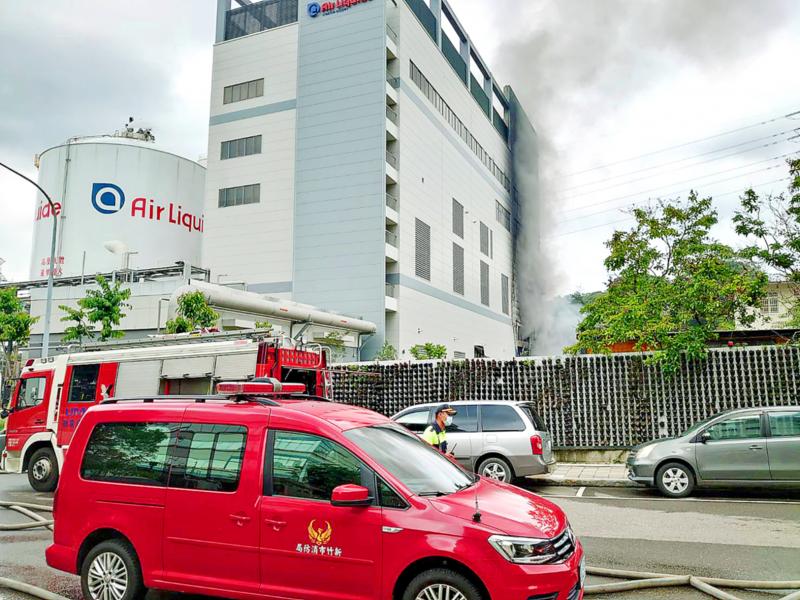A fire that broke out at Air Liquide Far Eastern Ltd’s (ALFE, 亞東工業氣體) plant in the Hsinchu Science Park (新竹科學園區) yesterday morning was likely caused by malfunctioning transformer units, the Hsinchu Fire Bureau said.
The blaze was extinguished at about 12:30pm, and no injuries were reported, the fire bureau said.
Seventy firefighters and 20 trucks were deployed to the site to put out the fire, which likely stemmed from overheating transformer equipment on the first floor of the six-floor ALFE building before spreading to the second floor, the bureau said based on a preliminary investigation.

Photo: CNA
Lin Tsai-hsuan (林采煖), an assistant manager at ALFE, said that staff in the building evacuated after the fire was reported at about 10am.
The ALFE facility at the Hsinchu Science Park is nearing completion after construction began in November 2020, she said, adding that the site is still in its testing phase.
The joint venture between France’s Air Liquide SA and Taiwan’s Far Eastern Group (遠東集團) provides natural gas supplies and services for Taiwanese electronics and medical industries, among others, in addition to homes.
The Hsinchu plant is being built to meet growing demand for natural gas among Taiwan’s semiconductor manufacturers, Lin said.
Hsinchu Science Park Bureau Deputy Director-General Chen Shu-chu (陳淑珠) said the fire caused a temporary voltage drop at the park, but no power outage occurred.
Taiwan Semiconductor Manufacturing Co (台積電) said that operations at its Hsinchu site were not affected by the incident, while Powerchip Semiconductor Manufacturing Corp (力積電) said its production was only partially interrupted, as some of its equipment did not have generators as backup.

Taiwan Semiconductor Manufacturing Co (TSMC, 台積電) last week recorded an increase in the number of shareholders to the highest in almost eight months, despite its share price falling 3.38 percent from the previous week, Taiwan Stock Exchange data released on Saturday showed. As of Friday, TSMC had 1.88 million shareholders, the most since the week of April 25 and an increase of 31,870 from the previous week, the data showed. The number of shareholders jumped despite a drop of NT$50 (US$1.59), or 3.38 percent, in TSMC’s share price from a week earlier to NT$1,430, as investors took profits from their earlier gains

In a high-security Shenzhen laboratory, Chinese scientists have built what Washington has spent years trying to prevent: a prototype of a machine capable of producing the cutting-edge semiconductor chips that power artificial intelligence (AI), smartphones and weapons central to Western military dominance, Reuters has learned. Completed early this year and undergoing testing, the prototype fills nearly an entire factory floor. It was built by a team of former engineers from Dutch semiconductor giant ASML who reverse-engineered the company’s extreme ultraviolet lithography (EUV) machines, according to two people with knowledge of the project. EUV machines sit at the heart of a technological Cold

Taiwan’s long-term economic competitiveness will hinge not only on national champions like Taiwan Semiconductor Manufacturing Co. (TSMC, 台積電) but also on the widespread adoption of artificial intelligence (AI) and other emerging technologies, a US-based scholar has said. At a lecture in Taipei on Tuesday, Jeffrey Ding, assistant professor of political science at the George Washington University and author of "Technology and the Rise of Great Powers," argued that historical experience shows that general-purpose technologies (GPTs) — such as electricity, computers and now AI — shape long-term economic advantages through their diffusion across the broader economy. "What really matters is not who pioneers

TAIWAN VALUE CHAIN: Foxtron is to fully own Luxgen following the transaction and it plans to launch a new electric model, the Foxtron Bria, in Taiwan next year Yulon Motor Co (裕隆汽車) yesterday said that its board of directors approved the disposal of its electric vehicle (EV) unit, Luxgen Motor Co (納智捷汽車), to Foxtron Vehicle Technologies Co (鴻華先進) for NT$787.6 million (US$24.98 million). Foxtron, a half-half joint venture between Yulon affiliate Hua-Chuang Automobile Information Technical Center Co (華創車電) and Hon Hai Precision Industry Co (鴻海精密), expects to wrap up the deal in the first quarter of next year. Foxtron would fully own Luxgen following the transaction, including five car distributing companies, outlets and all employees. The deal is subject to the approval of the Fair Trade Commission, Foxtron said. “Foxtron will be